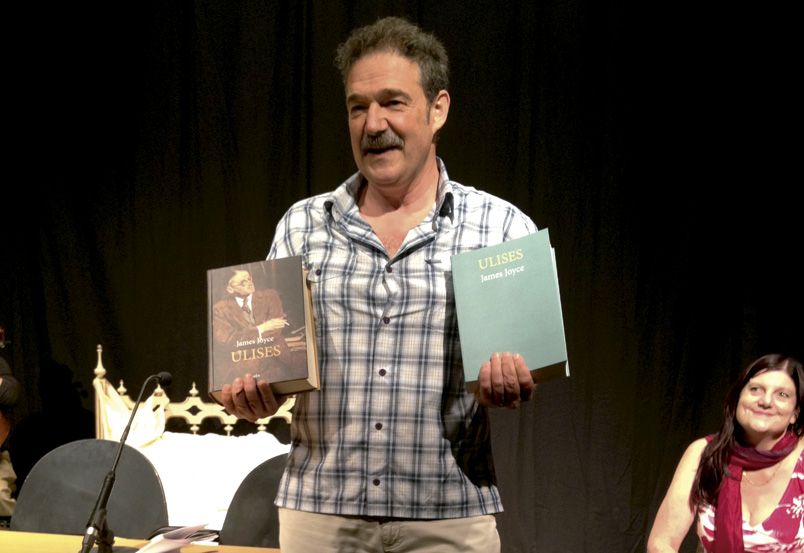

Badaukagu James Joyceren Ulises euskaraz. Irailaren 7an aurkeztu du Igela argitaletxeak XX. mendeko literaturaren gailurtzat jotzen den obraren itzulpena. Xabier Olarrak egin du eta, testuaren berezitasun eta zailtasunak kontuan izanda, euskarazko itzulpengintza literarioan mugarria izango dela dirudi.
Idazle irlandarraren obra goraipatuena euskaratzeko asmoa ez da atzo goizekoa, Olarrak berak Koldo Mitxelena Kulturunean liburua aurkezterakoan azaldu zuen moduan. Besteak beste, Gabriel Arestik lanaren parte handi bat aurreratua zeukan, baina Guardia Zibilaren kontrol batean kendu egin zioten.
Urte askoren ondoren plazaratu zen berriro itzulpen horren premia. Olarrak umorez gogoratu zituen lagunartean egindako bi afari literario. Gaia airean zebilen, egin beharra zegoen, baina itzulpena bere esku hartzeko prest zegoen inor ez mahaian, bigarren afarian Olarrak berak heldu zion arte: argitaratzeko lanen zerrendan sartu zuten, egin egingo zuten. Eta itzultzaile tolosarrak eguneroko ogia ziurtatzen duten betebeharretatik erretiroa hartu zuenean sartu zen buru-belarri nobela mardularen euskaratze lanean.
2012a zen: Olarrak hamar bat urteko tartea jarri zion bere buruari lana burutzeko; hartara, zailtasun ugari dauzkan testua eguneko 500 karaktereko erritmoan euskaratu ahal izango zuen. Gero Europar Batasunak literatur itzulpenak bultzatzeko eskaintzen duen diru-laguntza lortu zuen ordea, eta horrekin batera epe-muga bat, 2015eko ekaina.
Edizio komentatua eta berezitasun batzuk
Bukatu da lana eta hemen da irakurlearentzat: edizio komentatua prestatu du Igelak, Ulises aztertu duten hainbat ikerlariren ekarpenak baliatuz. Ez hori bakarrik, Ulisesen egitura hobeto ulertzeko Joycek berak Carlo Linati lagunari prestatu zion eskema ere –“Linati eskema” gisa ezaguna– gehitu diote euskarazko edizioaren amaieran, baita nobelaren 7. episodioko figura erretorikoen azterketa ere.
Edizio mardula beraz, darabilen euskaran ere berezitasunik baduena: batuan idatzita dagoen arren, nobelak bertsio originaleko 14. episodioan darabiltzan ingeles erregistro-ugariek beste iturri batzuk ere eskatzen zituzten, euskarazko testu klasikoetatik abiatu eta gaur egungo hizkeraraino –ingelesezkoak ere latinaren imitaziozko hizkeratik Dublingo auzoetako hizkeraraino egiten du–.
Protagonisten generoa desberdintzeko Olarrak hartu duen erabakiak ere eman dezake zeresana: ingelesetik itzultzean “he” eta “she” bereizi ezinaren langa gainditzeko, Ulisesen emakumezkoei buruz ari diren determinatzaileek azentu marka izango dute –adibidez, “húra”–. Ausardiaz jokatu du itzultzaileak beraz. Obrak hala eskatzen zuen.